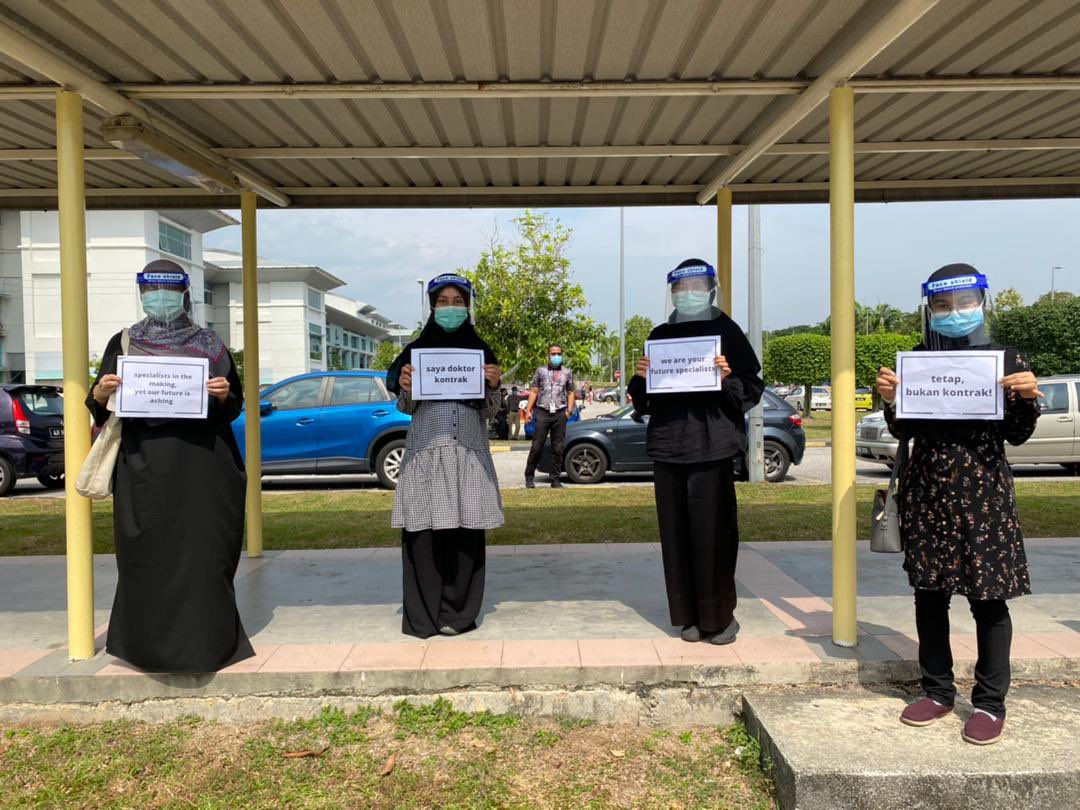KUALA LUMPUR, Feb 8 – About 63 per cent of contract health care workers (540 people), predominantly doctors, are willing to participate in a strike from work, according to a CodeBlue survey.
They include 390 medical officers (72 per cent), 104 house officers (19 per cent), 31 pharmacy officers (6 per cent), 10 dental officers (1.8 per cent), three assistant medical officers (0.5 per cent), a medical lab technologist (0.2 per cent), and a science officer.
Another 32 per cent (273 people) are uncertain about taking industrial action. Only 5 per cent are opposed to striking.
Put together, a whopping 95 per cent, or 813 contract workers from the government health service, are either willing to or uncertain about taking part in a strike if one was organised for health care professionals or workers in the public health care sector.
In the permanent staff subset of the survey, 41 per cent expressed readiness to go on strike, including 78 medical specialists and subspecialists.
Contract doctors made headlines for holding a one-day strike in mid 2021. Hartal Doktor Kontrak (HDK), which organised the one-day strike among contract doctors in 2021, has recently issued a fresh call for government doctors to join their movement.
HDK did not specify if they are planning to organise another strike.
Meanwhile, a whopping 83 per cent of contract health care workers (713 people) are thinking of quitting their jobs in the public health sector.
Out of the 713 contract health care workers who are thinking of quitting the service, 71 per cent are medical officers (506 people), 22 per cent are house officers (155 people), and five per cent are pharmacy officers (38 people).
Medical doctors comprise 92 per cent of the contract staff subset numbering 854 people in CodeBlue’s survey. Other contract staff include nine dental officers, three assistant medical officers, a medical lab technician, and a science officer.
About 88 per cent of contract staff (750 people) felt that the government is not serious in addressing issues in the public health care system, while 86 per cent (736 people) felt insecure about their career progression.
Another 86 per cent (735 people) said they are underpaid, while 83 per cent (708 people) said they are overworked. About 28 per cent (243 people) said they face workplace bullying, while three per cent (26 people) said they face sexual harassment at work.
Contract staff expressed higher work dissatisfaction levels than their permanent counterparts in CodeBlue’s survey that polled 1,652 government health care workers last month, mostly MOH staff. CodeBlue’s poll saw slightly higher representation among contract workers (52 per cent) than permanent employees (48 per cent).
More contract workers (63 per cent) are willing to go on strike, compared to 41 per cent of permanent staff. A higher proportion of contract staff also want to quit their jobs at 83 per cent, compared to 62 per cent of their permanent counterparts.
Some 13 per cent of respondents (107 people) from among contract staff wrote verbatim responses on issues that they’re facing at work. They largely wrote about still being under contract despite years of service, unable to further their studies, toxic work environments, long working hours, overcrowding at public health care facilities, and poor equipment.
A contract medical officer at a Ministry of Health (MOH) hospital in Perak wrote: “After five years of service, my grade remains as UD43, while my permanent counterpart gets a UD48 grade with salary increment.”
According to the Public Service Department (JPA), the starting salary for a UD41 grade position is RM2,947. The starting salary for a UD43 grade position is RM3,611.
One contract medical officer at an MOH hospital in Selangor said many aspects of the current public health service system are “not working out”.
“The current on-call system should be modified with reference to the system used overseas i.e. Australia. The criteria for entrance into a parallel training programme/ EHLP (hadiah latihan persekutuan) – why the restrictions when there are doctors who are interested and willing to be trained? If experience/ quality is of concern, you can extend them in the programme to make sure they reach the necessary qualities to complete the training.”
A house officer working at an MOH hospital in Johor described not having a work-life balance. “Worn out every day by work and even need to take care of working issues during rest days. Schedule release at the very last minute all the time, unable to make plans for occasions and life events.”
Another contract medical officer working at a klinik kesihatan in Selangor wrote that she no longer receives allowances for working on weekends and that claims are not guaranteed.
“Day by day, our claims [are being] cut. No more weekend allowance, claim hours also not always granted. Shift system is not something we are looking for. In the current economic situation, everyone needs extra income. Insecurity for sure will affect quality.”
Last year, then Health Minister Khairy Jamaluddin told Parliament that a record 768 contract doctors left their jobs in the MOH in 2021, as soaring Covid-19 caseloads due to the Delta variant overwhelmed hospital systems nationwide.
Official data from 2017 until 2021 showed that 2,032 contract medical officers had quit, with 2021 reporting the highest number of resignations, accounting for over a third of the total figure.








